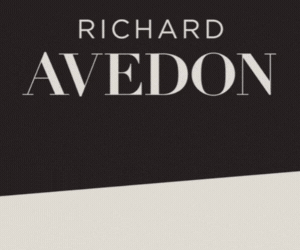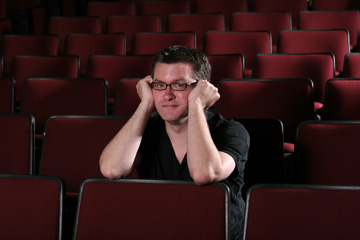 If you’re heterosexual, that menu might make you a little grumpy. Now think about how you’d feel if that fare remained essentially unchanged for years – and maybe you can understand the lesbian and gay community’s love-hate relationship with the movies. Todd Camp, co-founder and artistic director of Fort Worth’s international gay and lesbian film festival Q Cinema, believes gay people might have an even more intense relationship with films than heterosexuals, ironically because they’ve been left out (or historically vilified) so often. Many have spent their lives searching for themselves on celluloid.
If you’re heterosexual, that menu might make you a little grumpy. Now think about how you’d feel if that fare remained essentially unchanged for years – and maybe you can understand the lesbian and gay community’s love-hate relationship with the movies. Todd Camp, co-founder and artistic director of Fort Worth’s international gay and lesbian film festival Q Cinema, believes gay people might have an even more intense relationship with films than heterosexuals, ironically because they’ve been left out (or historically vilified) so often. Many have spent their lives searching for themselves on celluloid.
Cinema is important to gay people for precisely the same reason it’s important to straights. Movies provide a reliable escape from life’s troubles – and even console us when they mirror those troubles in stories that resemble our lives. The 41-year-old Camp remembers sitting in a dark theater when he had what he calls an “Aha!” movie moment, the instant when he really connected with a gay character onscreen. He’d already been out of the closet for years and was in the relationship he still shares with his partner Doug Hopkins. Still, a little moment from 1998’s Billy’s Hollywood Screen Kiss, a beloved indie film starring a pre-Will and Grace Sean Hayes, struck him hard.
“Hayes and Brad Rowe are in bed together,” Camp said. “Rowe has his back to Sean, and Sean wants to touch him so badly. He reaches out to touch Brad’s back, but something makes him pause. He lets his hand fall. “I thought ‘Aha!’ I’ve done that. I know that feeling. It was a little thing, but it was very intense for me. I think it was the first time I really appreciated the role of gay cinema.”
Coincidence or not, 1998 would also be the first year for Q Cinema. What began as an enthusiastic screening in Camp’s living room would, a decade later, graduate to a 10-day schedule of independent international films including comedies, dramas, documentaries, and shorts, plus live theater and music. The festival is pretty much Camp’s baby – as artistic director, he handpicks the movies, arranges the schedules, and has some say in pretty much every administrative and technical aspect. He relies on a small army of enthusiastic, long-time members and volunteers, of course, to get the ship sailing, both for monthly Q Cinema screenings and for the annual festival.
It’s a daunting task. Besides keeping up with the top gay and lesbian festivals around the country – especially those in San Francisco, Miami, and Philadelphia – Camp has to weigh the tastes of a diverse community that many will tell you share one trait: They’re very, very picky. In particular, he has to figure out how to balance the often-divergent interests and expectations of lesbians vs. gay male audiences.
And then there’s the emerging generation of gay adults in their 20s, who’ve grown up surrounded by pirated DVDs and movie downloading. Driving to a theater to watch a movie is beginning to seem kind of quaint to them. Twentysomething gays are also more comfortable about their sexuality than young people in the past; many of their straight friends are not just tolerant, they’re downright friendly on the subject of homosexuality. So Camp finds himself working to recruit new audiences who openly wonder: Are we approaching the point where a separate film festival for gays and lesbians is irrelevant?
It’s tough running a queer film festival in Cowtown in 2008. But the chatty, indefatigable Camp seems the right man for the job. People may recognize Camp’s name from his byline in the Fort Worth Star-Telegram. He’s filled a variety of roles during his 16-year tenure there. Currently, he writes DVD reviews and edits the paper’s “Go!” (weekend guide) and “Live!” (overnight review) sections. His creative impulses could be described as “restless” – he has also dabbled in newspaper production design and cartooning (he drew a regular strip for a now-defunct gay newspaper in the area) and has occasionally performed in local stage productions.
In his hometown of Corpus Christi, he nurtured a steady passion for movies, novels, and theater as he worked up the Boy Scout chain to Eagle Scout status. He moved to Fort Worth and got a bachelor’s degree in journalism from TCU. After a short stint at the Denton-Record Chronicle, he joined the Star-Telegram staff in 1992. “I was a late bloomer as far as coming out,” said Camp. It wasn’t until the age of 26 that he began to tell friends and, finally, family about his sexuality. Meeting and falling in love with his current partner, Doug Hopkins, sped up the process. “Doug is very big on Christmases and holidays as family events,” said Camp. So he approached his mother first and told her. There was “the requisite hand-wringing,” he said, although she let him know she supported him and wanted him to be happy.
His father was a different story. Fearing the reaction, Camp informed Dad of the news – in a letter, nearly a year after telling Mom. Mr. Camp replied with a missive of his own that was “angry and hostile,” said Camp, although his father finally agreed to meet Doug. The ice eventually thawed. “It’s hard to dislike Doug,” Camp said. “Plus, I knew they’d get along. I’m the guy who likes movies and musicals; Doug knows how to work on cars.” Soon Camp became a regular film critic for the Star-Telegram, just about the time that the so-called “Queer Cinema” indie boom of the 1990s hit. He began writing about the films of writer-directors like Todd Haynes, Greg Araki, Mary Harron, Rose Troche, and Tom Kalin. Many of their movies were all about provocation, aesthetic innovation, uneasy atmosphere, and experiment. None of the filmmakers were at all interested in putting candy-coated “positive” gay role models onto the screen.
Amidst this much-publicized rush of guerilla-queer images, it occurred to Camp that he didn’t know as much as he should about pre-’90s lesbian and gay cinema – what there was of it. In 1998, the same year he watched that identity-affirming scene in Billy’s Hollywood Screen Kiss, he was approached by Shawn Moore, then president of the Tarrant County Lesbian and Gay Alliance. She had similar concerns that the 1990s gay movie explosion was bypassing Fort Worth. “She wanted to start a film discussion group, and so we brainstormed,” Camp said.
That first screening for the group was, appropriately, Rob Epstein and Jeffrey Friedman’s documentary The Celluloid Closet, based on Vito Russo’s page-turner of a film history book. Both movie and book are engrossing primers on the funny, sad, and lurid record of gay and lesbian characters in 20th-century cinema. Certain landmark movies are examined, like the savagely funny The Boys in the Band (1970), in which a group of gay men seem to compete in one New York City apartment for the title of “Most Self-Loathing”; the equally acidic comedy The Killing of Sister George (1968), about an aging British soap opera actress who struggles to maintain her career and her much younger female lover; and the infamous D.H. Lawrence adaptation The Fox (1967), in which Sandy Dennis is arbitrarily crushed by a falling tree at the film’s climax – apparently, as cosmic punishment for luring her girlfriend back from a male rival.
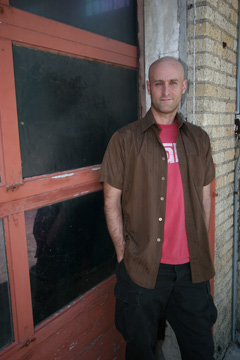 “These were important movies, groundbreaking movies, movies that had to be made,” said Camp. “Unfortunately, most of them were also rather depressing.” The small group in Camp’s living room – a few of whom had seen these movies, but most of whom had not – all shared the same sentiment: The good, the bad, and the ugly of gay movie images had to be shared with a wider audience. Shawn Moore was inspired to suggest that she and Camp create a full-blown lesbian and gay film festival for Fort Worth – as much for outreach within the city’s generally decentralized homosexual population as for film-geek appreciation. “I wanted to create a date night for gay couples, a place where they could go after dinner and be comfortable holding hands and snuggling if they wanted to,” said Moore, 56. “Also, I wanted them to see their experiences validated as authentic and important.”
“These were important movies, groundbreaking movies, movies that had to be made,” said Camp. “Unfortunately, most of them were also rather depressing.” The small group in Camp’s living room – a few of whom had seen these movies, but most of whom had not – all shared the same sentiment: The good, the bad, and the ugly of gay movie images had to be shared with a wider audience. Shawn Moore was inspired to suggest that she and Camp create a full-blown lesbian and gay film festival for Fort Worth – as much for outreach within the city’s generally decentralized homosexual population as for film-geek appreciation. “I wanted to create a date night for gay couples, a place where they could go after dinner and be comfortable holding hands and snuggling if they wanted to,” said Moore, 56. “Also, I wanted them to see their experiences validated as authentic and important.”
Jim Elder is a Q co-founder who was at Camp’s house for that first Celluloid Closet screening. “So many gay Cowtowners had never heard of the old movies,” Elder said. And with the “Gay ’90s” indie film flood lapping at Tarrant County’s doors, there was a need to find reliable venues for both the old and the new offerings. “Fort Worth has many great qualities, but it can be a bit parochial,” Elder said. “That includes our community. We wanted Q Cinema to be an educational project” as well as entertaining. “If we didn’t show these movies, people in Fort Worth wouldn’t see them at all.”
And so Q Cinema was created with many volunteers working long hours. Duties were distributed: Camp became artistic director, Moore was director of events, Hopkins was technical director. Elder began by doing simple administrative things – taking tickets, working the box office, etc. – and eventually became director of community relations. Over the next year, the group held public screenings and discussions in TCU’s Moudy Building. They soon expanded to scheduling movies in sympathetic churches, the local AMC cineplexes, downtown’s Four Day Weekend Theater, Casa Mañana, the Ridglea Theater, and, finally, the Rose Marine Theatre.
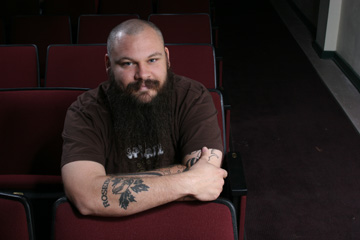 At the time, Doug Hopkins was a professional dancer near the beginning of his 10-year tenure as a senior member of the now-defunct Bruce Wood Dance Company. For his role as technical director, he taught himself to work with sound and video systems, to discern the difference between Digitbeta and VHS formats, and to run a film projector. His childhood had given him a bit of a head start: His mother bought him a Super 8 movie camera when he was just 11, and he had a blast making his own movies. Operating a film festival, on the other hand, “is a very stressful thing,” he said. “Stress and I are not a good combination. So I keep a certain amount of distance. I consider that I am busy one night a month for screenings and then 10 nights, or however long it lasts, for the annual festival. And that’s it.
At the time, Doug Hopkins was a professional dancer near the beginning of his 10-year tenure as a senior member of the now-defunct Bruce Wood Dance Company. For his role as technical director, he taught himself to work with sound and video systems, to discern the difference between Digitbeta and VHS formats, and to run a film projector. His childhood had given him a bit of a head start: His mother bought him a Super 8 movie camera when he was just 11, and he had a blast making his own movies. Operating a film festival, on the other hand, “is a very stressful thing,” he said. “Stress and I are not a good combination. So I keep a certain amount of distance. I consider that I am busy one night a month for screenings and then 10 nights, or however long it lasts, for the annual festival. And that’s it.
“Todd thrives on stress,” Hopkins added. “He’s a workaholic and a perfectionist. That can be a dangerous combination, but it works very well for the festival.” In 1999, Q Cinema made a splashy downtown premiere at the AMC Sundance 11 with the hot indie picture Trick. “Todd and I were terrified that people wouldn’t show,” Shawn Moore said. “But that night, people were lined up around the block.” A partial explanation for the turnout, Camp thought, was: “You know, it featured men in various stages of undress. But we’ve always tried to find the hot movie of the moment and book it.” He believes one of the reasons that Q Cinema has been a consistently “break-even” organization – “the only year we lost money was 2001, and that was a bad year for everybody” – is that it was and still is, as far as he knows, the only self-identified lesbian and gay arts group in the city. Fort Worth has never really had a “queer central” event or street or even neighborhood. The bar scene here waxes and wanes like the moon. A hungry audience was available and waiting to be asked to see these movies.
The festival, which soon incorporated as a nonprofit, has also made a concerted effort to show not just a variety of stories and viewpoints, but flicks that challenge the conventional wisdom – even, maybe especially, the conventional wisdom of gay folks. Based on years of research and phone networking, Camp has come to rely on the annual programming of U.S. international festivals in Miami and Philadelphia, among others, to help him book the features and shorts from all over the world that Q Cinema screens. “I err on the prude side compared to other cities’ festivals,” he said. Q Cinema’s schedule is not determined by committee, but solely by Camp. He considers this solo responsibility mostly a strength, claiming that Fort Worth’s small festival doesn’t encounter the clash of taste issues that complicate other fests. But he also recognizes he has to take into account his own blind spots.
“I try to book films that I don’t personally like but that I recognize are quality and speak to another person’s experience,” he said. “But it never ceases to amaze me what will upset people. I think sometimes, as a community, we’re too protective of our image to the outside world. We don’t want to show the warts. But how else can we be honest with ourselves? “Years ago, we showed what I thought was a unique drama about an incestuous relationship between two brothers,” he said. The film didn’t endorse such relationships, “but I thought people – gay people – were going to burn me in effigy afterward.” Tom Huckabee was artistic director for last year’s debut Lone Star Film Festival in Fort Worth and a board member of the Lone Star Film Society along with Camp. He’s 52, heterosexual, and impressed with Camp’s skills as an artistic director. “Todd has great taste in film, and he’s very discriminating about the people he chooses to work with,” Huckabee said. “There are roughly 5,000 film festivals operating in the country. You have to have a niche audience in mind both to attract ticket-buyers and to have an organizing principle for your schedule. Q Cinema has succeeded at its mission. It’s a very well-run organization, and I consider it one of the most important arts institutions in the city.”
The festival’s “niche audience” is still controversial in some circles. But Camp and others in the organization claimed they haven’t encountered any dramatic homophobic resistance during its gradual 10-year growth. They’ve had potential ticket-buyers assume they showed porn flicks. (They don’t.) A local printer once refused their business after the print company bosses read what the festival programs contained. Other than that, Q has operated quietly but determinedly in a queer Cowtown limbo – trying to please a Fort Worth gay audience that itself may not be sure what it wants.
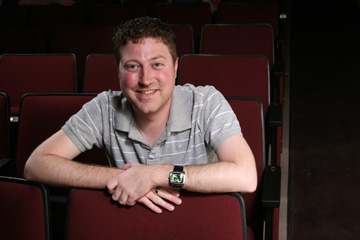 One constant issue, Camp said, has been how to equitably serve the tastes of both female and male audiences – two halves of the gay community that often diverge in their entertainment choices. “In the history of cinema, there are many, many more male directors than female directors,” he said. “It’s the same with gay movies – women haven’t made those inroads, either. And so there are more men’s stories directed by men. I work my ass off to program stories about gay women, but there are fewer choices, and honestly, the quality isn’t the same.”
One constant issue, Camp said, has been how to equitably serve the tastes of both female and male audiences – two halves of the gay community that often diverge in their entertainment choices. “In the history of cinema, there are many, many more male directors than female directors,” he said. “It’s the same with gay movies – women haven’t made those inroads, either. And so there are more men’s stories directed by men. I work my ass off to program stories about gay women, but there are fewer choices, and honestly, the quality isn’t the same.”
Even in the world of homosexual filmgoers, there’s a divide that heterosexuals might recognize: Lesbians will watch movies about gay men, Camp claimed, but gay men often won’t go to see movies about lesbians. As most gay people will tell you, their community can’t make any progress without the help of its cool straight friends. Count 35-year-old James Johnston among the latter. He’s directed and produced local indie features and shorts and is a board member of the Lone Star Film Society. He also happens to be married to Amy McNutt, owner of the Spiral Diner, which is a Q Cinema sponsor and contributor.
Johnston has known Camp for years and has monitored the evolution of Q Cinema. “It’s by far the longest running film festival that Fort Worth has been able to sustain,” he said. “As a member of the local film community, it’s important for me to keep up with what they’re doing.” For this year’s 10th anniversary festival, Camp approached Johnston with an idea he called “Project Q 10.” The concept was to shoot short movie “trailers” to insert before the festival’s screenings. These would be personal testimonies by lesbians and gays of how a particular movie affected them. Johnston shot 10 individual interviews that lasted somewhere between 90 seconds and three minutes each. Most of the subjects were Q Cinema board members or their friends.
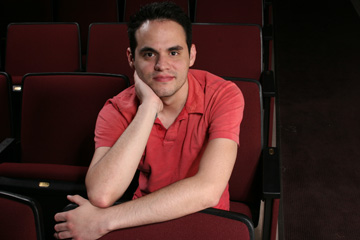 “What was interesting to me was that there were two common themes,” said Johnston. “Coming out was one, and finally feeling like part of a community was another. One guy talked about a scene from Sordid Lives (a campy comedy about a Southern family’s travails) and how one character in the movie told his mother he was gay [and that] was exactly like him telling his mother. It was very personal for him. “Another guy talked about how he attended a screening of Priscilla, Queen of the Desert in Los Angeles. He knew all the ‘insider’ jokes. He was laughing with all the other gay people in the audience. It was the first time he didn’t feel like the weirdo, the outsider.” As far as his own comfort level in delving so deeply into the experiences of homosexuals, Johnston said he’s had an “in” for years now: Both his brother and one of his best friends (a filmmaker with a movie in this year’s festival) are gay. He’s socialized with his wife at gay clubs in town. It’s a non-issue for him, a no-brainer.
“What was interesting to me was that there were two common themes,” said Johnston. “Coming out was one, and finally feeling like part of a community was another. One guy talked about a scene from Sordid Lives (a campy comedy about a Southern family’s travails) and how one character in the movie told his mother he was gay [and that] was exactly like him telling his mother. It was very personal for him. “Another guy talked about how he attended a screening of Priscilla, Queen of the Desert in Los Angeles. He knew all the ‘insider’ jokes. He was laughing with all the other gay people in the audience. It was the first time he didn’t feel like the weirdo, the outsider.” As far as his own comfort level in delving so deeply into the experiences of homosexuals, Johnston said he’s had an “in” for years now: Both his brother and one of his best friends (a filmmaker with a movie in this year’s festival) are gay. He’s socialized with his wife at gay clubs in town. It’s a non-issue for him, a no-brainer.
“The thing I appreciate about Todd is, he programs more than just the popular comedies that’ll play with the ‘gay base,’ or whatever,” said Johnston. “He programs very unusual films, very personal stories that you’re not going to automatically ‘get’ just because you’re gay.” Richard Rangel, program coordinator for the Rose Marine, home for this year’s festival, agreed. The 24-year-old heterosexual volunteered for a few hours at last year’s Q Cinema because of his connection to the theater venue. His family is full of artists, he said, so he’s known openly gay people since he was a kid. He was so impressed with a couple of films he saw that he became a Q Cinema board member this year.
The movies they show aren’t as unfamiliar as a lot of straight people might think, he said. “They’re not about people from a different planet. They’re about men and women. I saw an amazing documentary about meth addiction in the gay community. It was from a different angle, but it was still about addiction, and a lot of people can relate to that.” Last year Huckabee saw a Taiwanese thriller about a phone sex worker who develops an erotic obsession with a female tattoo artist. “It was fantastic,” he said. “You certainly didn’t have to be gay to enjoy it.” Camp has been aware for a while that his lesbian and gay audience seemed to be aging along with the festival. Not so many homosexuals in their 20s were attending. Two years ago, Kyle Trentham, 28, joined the board as sort of a jack of all trades. “Basically, during the festival, I’m Todd’s bitch,” he said, laughing. “I do whatever he needs done, from ad sales to running audio and video.”
He was soon given an official title: director of new media. Trentham helped redesign the festival’s web site and created a Q Cinema page for the MySpace and Facebook sites. He also did some informal youth outreach, talking to young GLBT adults about their interests and attitudes, in an effort to keep the festival current. What he already knew – and had to explain to Camp and other festival officials – could be summed up in one sentence: “Get rid of the fucking rainbow flags!”
“Todd and I are great friends, but we’ve butted heads a few times, especially if there’s alcohol involved,” Trentham said.
“We call it the ‘old gay vs. new gay’ debate. I told him and other board members that young people today don’t identify themselves quite as much by their sexual orientation as previous generations did. They don’t see themselves as ‘gay people’ – they see themselves as ‘people who happen to be gay.’ They’re out about their orientation, but they don’t necessarily want to surround themselves exclusively with other gay people.”
The derogatory term “That’s so gay!”, when used by young gay people, is an expression of this generation gap. Trentham acknowledged the indispensable cultural and political accomplishments of older community leaders who, out of sheer necessity, huddled inside urban gay culture like it was a bomb shelter. But the pink triangles, the dance music divas, the dim smoky cruise bars, the words “fabulous!” and “girlfriend!” – to many people Trentham’s age and younger, these are relics from a passé culture. It’s reminiscent of young women who enjoy the rights earned by their feminist forebears, but are themselves wary of the “F” word.
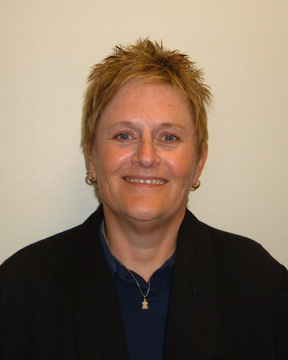 Trentham doesn’t think the youth culture of pirated DVDs and free video content on the web is a special problem for Q Cinema – at least, no more so than for every other film festival in America and the movie business in general. He thinks there’s a bigger issue for young gays in the Q audience: some of the festival’s more predictable fare. “Speaking for myself and other younger gay people I know, there are three things we don’t want to see,” he said. “Another coming-out story, another gay-bashing story, and another AIDS documentary. HIV is not even on the minds of young people – which, I know, is a very bad thing, because infection rates are skyrocketing again. But I feel like you have to stay ahead of the curve if you want to bring new people in.”
Trentham doesn’t think the youth culture of pirated DVDs and free video content on the web is a special problem for Q Cinema – at least, no more so than for every other film festival in America and the movie business in general. He thinks there’s a bigger issue for young gays in the Q audience: some of the festival’s more predictable fare. “Speaking for myself and other younger gay people I know, there are three things we don’t want to see,” he said. “Another coming-out story, another gay-bashing story, and another AIDS documentary. HIV is not even on the minds of young people – which, I know, is a very bad thing, because infection rates are skyrocketing again. But I feel like you have to stay ahead of the curve if you want to bring new people in.”
Camp has heeded Trentham’s words, and in more ways than just an updated internet presence. The upcoming 2008 festival features the usual mix of state, regional, and U.S. premieres, but there’s a healthy dose of “new gay” fare, such as a documentary exploring the touchy subject of bisexuality among young people and a French comedy about a lesbian couple trying to have a baby through various disastrous reproductive methods. Still, Camp disagrees with Trentham on some things. “As long as people have to come out to their families, there’s a need for good coming-out movies,” he said. “We’re still getting infected with HIV; we’re still demonized by the religious right and getting beat up and killed because we’re gay.” He thinks that as long as the quality of the movies is strong, the traditional gay film genres will survive – at least for the foreseeable future.
Over its history, Q Cinema has slowly but steadily built an audience. The first year’s festival saw around 600 attendees; Camp estimated that close to 2,000 people have bought tickets each of the past two years. Huckabee, the former Lone Star Film Festival artistic director, thinks the expansion doesn’t have to stop there. “I see great ‘crossover appeal’ potential for Q Cinema. I think different kinds of people would start to come if they can get the word out about the movies,” he said. “It’s interesting to me that the festival is hosted by a Latino arts organization. It’s a great blending of cultures.”
Who knows what Q Cinema might look like in another 10 years? Camp freely acknowledged that the integration of lesbians and gays into the wider social fabric is already under way, and he certainly won’t fight it. But he has his own “That’s so gay!” moment when he slyly quotes from a West Side Story tune about his hopes for the future of Q Cinema: “I just hope that, somewhere, there’s a place for us.”
The 2008 Q Cinema International Gay and Lesbian Film Festival runs May 29-June 7 at the Rose Marine Theatre. For schedule and ticket info, go to www.qcinema.org.
You can reach Jimmy Fowler at
jimmy.fowler@fwweekly.com.



